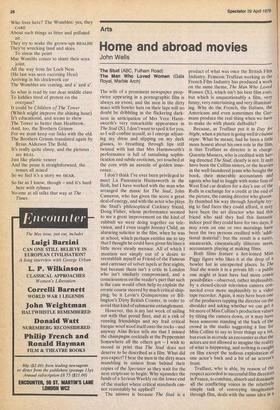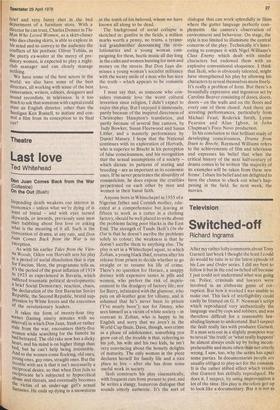Arts
Home and abroad movies
John Wells
The Stud (ABC, Fulham Road) The Men Who Loved Women (Gala Royal, Marble Arch)
The wife of a prominent newspaper proprietor appearing in a pornographic film is always an event, and the men in the dirty macs with bowler hats on their laps will no doubt be dribbling in the flickering darkness in anticipation of Mrs Vere Harmsworth's very remarkable appearance in The Stud (X). I don't want to spoil it for you, so I will confine myself, as I emerge adjusting my dress and slipping on my dark glasses, to breathing through lips still twisted with lust that Mrs Harmsworth's performance is full of tantalising sophistication and subtle eroticism, yet touched at the core with an aureole of golden innocence.
I don't think I've ever been privileged to meet La Pasionaria Harmsworth in the flesh, but I have worked with the man who arranged the music for The Stud, John Cameron, who has given the score a great deal of energy, and with the actor who plays the Stud's philosophical Cockney friend, Doug Fisher, whose performance seemed to me a great improvement on the kind of rubbish we were doing together on television, and I even taught Jeremy Child, an alarming solicitor in the film, when he was at school, which perhaps entitles me to say that I thought he could have given his lines a little more steady menace. All of which I mention not simply out of a desire to reestablish myself as Friend of the Famous and carresser of velvet lapels at first nights, but because there isn't a critic in London who isn't similarly compromised, and a consciousness on the reader's part that such is the case would often help to explain the erratic course steered by much critical shipping, be it Levin's Quinquereme or Billington's Dirty British Coaster, in order to avoid that kind of submarine entanglement.
However, this is my last week of sailing out with that proud fleet, and at a risk of running friendships and my frail critical barque woof woof itself onto the rocks —and anyway Alan Brien tells me that I missed the champagne cocktails at the Peppermint Somewhere all the others got — I wish to record in print that The Stud does not deserve to be described as a film. What did you expect? I hear the men in the dirty macs mumbling in unison from behind their copies of the Spectator as they wait for the next striptease to begin: Why squander the funds of a Serious Weekly on the lower end of the market where critical standards cannot reasonably be applied?
The answer is because The Stud is a product of what was once the British Film Industry. Francois Truffaut working in the French Film Industry has produced a work on the same theme, The Man Who Loved Women (X), which isn't his best film ever, but which is unquestionably a film, very funny, very entertaining and very illuminating. Why do the French, the Italians, the Americans and even sometimes the Germans produce the real thing when we have to make do with plastic'claffodils?
Because, as Truffaut put it in Day for Night, when a picture is going well /e cinema regne. What he meant, had he been a little
more honest about his own role in the film, is that Truffaut as director is in charge.
Quentin Masters, who is credited with haying directed The Stud, clearly is not. It may have been the Collins sisters, or the heavies in the well-laundered jeans who bought the book, their miserable accountants and .
agents who had to haggle with some firm of West End car dealers for a day's use of the Rolls in exchange for a credit at the end of
the picture, the casting director who gloomily thumbed his way through Spotlight try
ing to find faces they could afford, it may have been the art director who had this friend who said they had this fantastic indoor pool they could have for two days, it may even on one or two mornings have been the two persons credited with 'addi tional thateriar: but the result is a nasty, amateurish, cinematically illiterate mess, accountants playing at making films.
Both films feature a hot-loined Miss Piggy figure who likes it at the drop of a
bowler hat in unexpected places. In The Stud she wants it in a private lift — a public one might at least have had more comic
possibilities — observed, rather implausibly, by a closed-circuit television camera connected even more implausibly to a video tape recorder. Again, it may have been one of the producers tapping the director on the shoulder and asking whether we can get a bit more of Miss Collins's production values by tilting the camera down, or it may have been someone standing at the back of the crowd in the studio suggesting a line for Miss Collins to say to liven things up a bit, but even in as crude an encounter as that the actors are not allowed to imagine the realitY of what is happening, and nothing is caught on film except the tedious exploitation of one actor's back and a bit of an actress's front.
Truffaut, who is able, by reason of the respect accorded to successful film directors
in France, to combine, absorb and dominate all the conflicting voices in the relativelY simple task of conveying imagination through film, deals with the same idea in a
brief and very funny shot in the bed department of a furniture store. With a director he can trust, Charles Denner in The Man Who Loved Women, as a skirt-chaser who dies chasing skirts, is able to explore in his mind and so convey to the audience the conflicts of his position: Oliver Tobias, as the pretty ex-waiter at the mercy of predatory women, is expected to play a nightclub manager and can clearly manage nothing.
We have some of the best actors in the world: we also have some of the best directors, all working with some of the best cameramen, writers, editors, designers and sound recordists, in television. I§ it too much to ask that someone with capital could trust an English director, other than the hooligan Ken Russell, to initiate and control a film from its conception to its final cut?



































 Previous page
Previous page